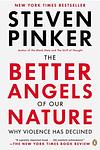Steven Pinker
Steven Pinker is a cognitive psychologist, linguist, and popular science author. He is known for his advocacy of evolutionary psychology and the computational theory of mind. Pinker has written several books that discuss language, the human mind, and human nature, including 'The Language Instinct', 'How the Mind Works', 'The Blank Slate', and 'Enlightenment Now'. He is a professor at Harvard University and has been named one of Time's 100 most influential people in the world.
Books
This list of books are ONLY the books that have been ranked on the lists that are aggregated on this site. This is not a comprehensive list of all books by this author.
-
1. The Better Angels Of Our Nature
This book presents a comprehensive analysis of violence throughout human history, arguing that, contrary to popular belief, we are living in the most peaceful era ever. The author uses a wealth of data to demonstrate how the rates of violence, from homicide to war, have decreased over centuries due to various social, cultural, and political developments. By examining the forces he believes have led to this decline, such as the spread of government, trade, and the influence of enlightenment thinking, the book offers an optimistic view of humanity's ability to reduce violence through reason and empathy, suggesting that our better angels are indeed winning the battle against our inner demons.
-
2. The Blank Slate
"The Blank Slate" challenges the conventional belief that human behavior is largely shaped by the environment and experience, arguing instead that genetics play a significant role. The book delves into the controversies surrounding this concept, exploring the implications it has on politics, violence, child-rearing, and the arts. It also argues that acknowledging our innate traits can lead to a more humane society, as it would allow for a better understanding of our strengths, weaknesses, and individual differences.
-
3. Enlightenment Now
The book presents a comprehensive case for optimism in the modern era, arguing that humanity has made significant progress in various aspects such as health, prosperity, safety, peace, knowledge, and happiness, largely due to the values of the Enlightenment—reason, science, humanism, and progress. The author challenges the pervasive sense of pessimism in contemporary discourse and defends the scientific mindset and rational thinking as the driving forces behind improvements in human well-being. By analyzing a wealth of data and trends, the book encourages readers to appreciate the progress achieved and to continue embracing the Enlightenment principles to address current challenges and further advance the human condition.
-
4. The Language Instinct
The book explores the idea that humans are born with an innate capacity for language. It argues that the ability to learn language is a natural instinct, hard-wired into our brains by evolution. Drawing from research in various fields including linguistics, psychology, and anthropology, the book examines how children learn language, how languages develop and change over time, and how the mind constructs and understands language. The author challenges the notion that language is a cultural artifact and instead presents it as a biological adaptation that is essential for human survival and communication.



